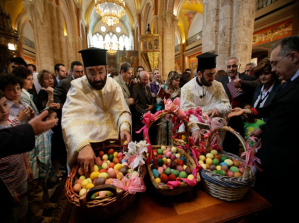
Many Christians around the world celebrated Easter to commemorate the death and resurrection of Jesus Christ after his brutal crucifixion on Sunday. However, some people are asking whether or not this Christian holiday still had religious meaning in modern times.
According to a report from Caroline Wyatt of BBC News, about 1.3 million people in the United Kingdom attended Easter services at the Church of England back in 2013, and 2.5 million attended Christmas services. However, religious leaders in England have bemoaned the increasing commercialization and secularization of the holiday.
"In a country that is still officially Christian, with almost 60 percent of people identifying themselves as such in the 2011 census (although far fewer actually attend church services, or believe in God), the religious message of Easter has been drowned out by the secular festival of chocolate and shopping being celebrated at supermarkets across the country," Wyatt wrote.
Wyatt reported that some British supermarket chains have refused to stock chocolate Easter eggs with an overtly Christian message, claiming that such products didn't sell well enough. One chain even asked the Meaningful Chocolate Co., a company that supplied the eggs, "what Easter had to do with the Church."
"It was a story that left many church leaders deeply saddened, and agonizing over how such a key time in the Christian calendar has apparently lost so much of its religious meaning," Wyatt wrote.
According to Wyatt, the Archbishop of York, Dr. John Sentamu, noted in his Easter Sunday sermon a few years ago that about a third of British children thought Easter marked the birth of the Easter bunny, while half of them had no clue of its religious significance.
"It wasn't a question that would have puzzled an older generation in the UK, many of whom remember with nostalgia the Easters of their childhood," Wyatt wrote. "Going to church on Easter Sunday might have been seen as a little dull, but it brought many families and communities together."
Will Dahlgreen of YouGov looked at how the young people of Britain viewed religion back in 2013. Based on the compiled data, many young people do not seem to be influenced by God in their lives.
"When asked if they believe in God, only 25 percent say they do," Dahlgreen wrote.
Dahlgreen added that "19 percent believe in some non-Godlike 'spiritual greater power' and a further 38 percent believe in no God or spiritual power whatsoever." While parents and friends have big influences in the lives of young people (82 percent and 77 percent respectively), religious leaders came out on the bottom.
"Only 12 percent feel influenced by them, which is far less than even politicians (38 percent), brands (32 percent) and celebrities (21 percent)," Dahlgreen wrote.
However, not everyone thought that Easter's relevance has faded away to youth apathy and secularization. Bishop Geoff Peddle told Roy Macgregor of the Globe and Mail that his church in Canada, the Anglican diocese of Eastern Newfoundland and Labrador, has managed to keep Easter's religious significance alive.
"Religious life is still pretty resilient here," Peddle said. "It's not what it used to be, of course, but people still want their children to be baptized, they want to be married in the church and they all want to be buried from the church. It's still very much part of the fabric of life."
Peddle thought that even though "the secular world has found a way to make money from it," the celebration of Easter as a religious holiday is still welcomed.
"The nice thing about the rhythm of church life is that you can see nature reawakening, as well," Peddle said. "You see life renewing itself. Easter and Passover are really good instances where the natural world and the religious world work together."
Rev. Gary Thorne, the university chaplain at King's College in Halifax, told Macgregor that people are still looking for meaning in life.
"It's largely to do with young people," Thorne said. "There's a hunger out there, a longing to find meaning in life. And it's true, generally speaking, of the major religions of the world that the religious cycle follows the pattern of nature. Bulbs that have been buried in the ground, seemingly dead, come to life again."
Even Wyatt acknowledged that angle, noting that "the answer is not more chocolate."
"While many of us may be able to sate our hunger for treats more often than in earlier decades, and the majority in the UK are either avowedly not religious or far less religious than in previous decades, there is a hunger that remains," Wyatt wrote. "It is a hunger for some kind of meaning in life, above and beyond the materialistic."






